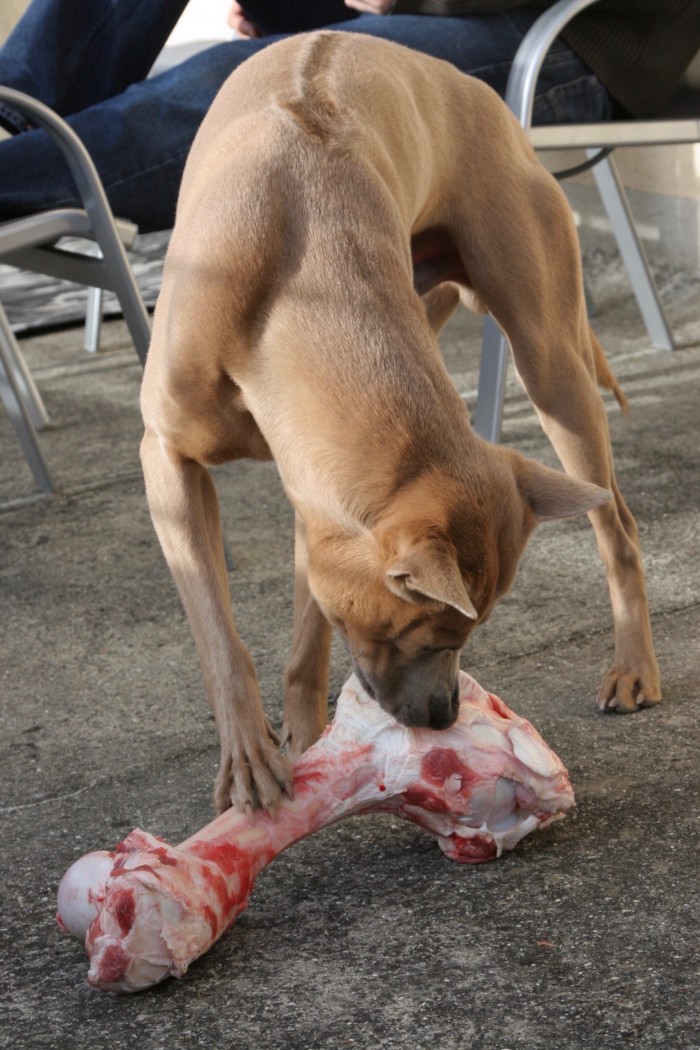It happened on a warm summer day somewhere near Zurich: We wanted to walk back home from a picnic on a rather crowded meadow. Our dog Lister was with us and he was off-leash, as we did not expect any wild animals to be present at this place. We were wrong: Suddenly we heard noises from a bush about 30 meters away from us and only 30 seconds later, we were standing next to a dead deer. We were terrified and ashamed. I don’t want to tell the sad story of what followed (in the end we had to pay 800 Swiss francs for „damaging property of the city of Zurich“…), but about Lister: He was a scary sight with blood still dripping from his mouth. But it was also very obvious, that he was thrilled and happy like never before in his life. He had found his destiny. From this day on, we could never let him walk off-leash anymore. He would immediately run away and go hunting again. He also lost his interest in hunting mice in the fields and similar activities as he knew now that this is not the real thing. I realized, that I could not give Lister what he really wanted. He did not want to get processed premium dog food („with Quinoa!“) from me without effort. He wanted to hunt by himself. To hunt was what his wolf ancestors did for hundreds of thousands of years and what his closer dog ancestors were kept for in the forests of Asia. To hunt was a great thing to do in the past, but in a modern society, it has become something wrong. Lister was actually very eager to work hard all day, but his efforts were simply not appreciated anymore (some people who had come to the scene told us that he should be put down). As a result he was forced to live a rather unfulfilling life.
In the following, I will explore, how this could happen and what it has to do with us humans. What is the main difference between Lister and me: he always just did what he wanted to do. He wasn’t even capable of doing something against his own will like I do all the time. Like for all animals, it is assumed, that what he wants to do, is also the right thing to do. It is hard for us humans to imagine, that this was once the case for us too: That we once enjoyed everything we did. We have come to a point were we associate work with „unpleasant“ and „hard“ and the fun stuff is reserved for the little free time we have. Many people think, that if work is not unpleasant, it is not really work and we should work even harder. But in our past, proper work was actually great fun!
To understand why, we have to think about what is driving us in life, what determines our behavior: It is the reward system in our brain. The reward system is designed, to reward us with good feelings for effective behavior. Now the problem is, that the reward system is shaped by evolution, and is changed on a very slow timescale (thousands of years). Our society on the other hand has changed dramatically during the last thousand years. Therefore the reward system is not aligned anymore with what is effective behavior in a modern society. And this is how technology makes us all unhappy in a very fundamental way: Technology changes society and the way we live, while the reward system remains the same. Therefore after some time, we don’t get rewarded for behavior which is unknown to the outdated reward system of our brain but which has now become necessary to survive. This is, how necessary activities become unpleasant hard work.
Let’s look at an example: To be lazy once was a wise thing to do. In ancient times, every injury was a serious threat to life as medical treatment was almost inexistent. Therefore, it was advisable to limit activities to only what was really needed. This is also the reason why humans stop playing when getting older: Playing is required for learning when one is young, but becomes an unnecessary risk later in life. But our modern society is almost free of substantial risks. We can work all day without risking injury. This gives people who work hard an advantage over those who don’t and as a consequence „hard“ work has become something everybody has to do to keep up with others.
It’s a general pattern: First we introduce some new technical solution into our life. For the individual it offers some advantage, so we embrace it. But then the new technology changes society and the way we live. In the end, as our brains are not adapted to the new life and we still have to compete with others, we all enjoy life a bit less.
As a result of technological progress, the activities we feel we have to do (and don’t really like) become more numerous every year. Just think about the school system: Our society has become so complex, that we spend a large part of our life learning. Some kids enjoy this to some extent, but many have to be forced every day to go to school. They would prefer to construct a tree house in the forest. The latter once was a skill which was very important to learn, but is obsolete nowadays and kids should learn integral calculus instead. Unfortunately the brains reward for learning integral calculus is much smaller than the one for building a tree house.
This trend will even accelerate as the future will probably be dominated by artificial intelligence and robotics. Highly complex technologies only a small fraction of people will be willing and able to master.
The future, as envisioned by Elon Musk, where people merge with machines, could be a very painful future for all of us. If this really happens, we would have to modify our reward system, for instance by taking drugs which make us feel good, no matter what we do and how ugly reality looks. Many of us will flee into the (virtual) world of computer games where they can, to some extent, live the old life they were designed for (e.g. living in medieval times as a knight). Was this what we had in mind when inventing all this technology? To go back in time to live a virtual life in ancient times? This sounds like a joke.
But, some might say, the virtual world offers the advantage that nobody gets really hurt. Yes, Lister really did kill the deer and not long ago humans enjoyed to go to the neighboring village to loot and steal women.
But how well do we understand suffering and death? I have suffered in my life and I embrace it as it made me human and helped me to enjoy my life now. I’m very sure that a future world without suffering is a world full of monsters (watch ‚Altered Carbon‘). What do we know about death? Nothing, except that we fear it like nothing else. But this is a compelling result of our history and the resulting evolution of our reward system: We are designed by evolution to fear death, but this does not mean that it really needs to be something bad. Our expectations are designed, to drive us into a certain direction, they don’t become necessarily true. For instance: We fear the pain when getting injured, this makes us avoid dangerous situations. But when we actually do get injured, we often don’t feel pain (stress hormones suppress it), which keeps us capable of action. I know a man who injured himself with a chainsaw in the face. He asked his wife to call the hospital but she passed out when she saw him. So he called the hospital himself. He is fine now. So maybe even death is not as bad as we fear.
Of course I have no final answers to this questions, but I think we should seriously start to think about all this before it is too late and we wake up in a dystopian future nobody wanted.


Images © author
Follow me on X to get informed about new content on this blog.
